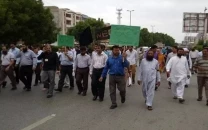SHC seeks arguments on maintainability of convicts’ appeals
Convicts were awarded death sentences by military court

PHOTO: EXPRESS
A two-judge bench, headed by Justice Naimatullah Phulpoto, asked the convicts’ lawyer, Hashmat Habib, to appear and make arguments on February 2.
A military court had awarded capital punishments in the case to Saad Aziz alias Tin Tin, Tahir Hussain Minhas alias Sain, Asadur Rehman alias Malik, Mohammad Azhar Ishrat alias Majid and Hanif Nazir on May 12 last year. The Islamic State-inspired group of youths had shot dead 45 members of the Ismaili community in the outskirts of Karachi in May, 2015.
SHC issues notice to Maryam, others over $70m US funds
However, the court acquitted three others, former Fishermen Cooperative Society deputy director Sultan Qamar Siddiqui, his younger brother Muhammad Hussain Siddiqui and Naeem Sajid, of charges of facilitating the massacre.
Earlier in the year Aziz, Minhas, Ishrat, Rehman and Nazir had filed appeals against the sentences awarded to them by the military court. On Thursday, the convicts’ lawyer, Hashmat Habib, was not present to make the initial arguments.
The judges directed the lawyer to appear on the next date to argue as to how the appeals filed by the convicted are maintainable.
Sindh advocate-general granted time for arguments in JIT reports' publication case
Case history
Filing appeals, Advocate Hashmat Habib argued that the appellants were tried before the military court, which was set up in Malir Cantonment under the Army Act, as part of Islamabad’s National Action Plan.
The appellants were kept at central prison where they were provided an appeal format to be filed before the Registrar Court of Appeals, Judge Advocate-General of the General Headquarters of the Army, said Advocate Habib.
He informed the judges that on August 15, 2016, the appellants were informed that their appeals had been rejected on July 25. They moved their appeals to the Lahore High Court, which on October 3, also turned them down on the matter of maintainability since the offence was committed and the trial conducted within the jurisdiction of the SHC.
SHC orders fresh trial in Shahzeb Khan murder case
Advocate Habib argued that the conviction judgment passed by the military court was not maintainable in the eyes of the law as the petitioners should not have been in custody of the military authorities and tried under the Pakistan Army Amendment Act or the Protection of Pakistan Act, 2014, which now stands expired.
He contended that the petitioners were illegally tried and that too in the absence of any counsel, which was a violation of Article 10 of the Constitution, as they were also not able to communicate during their trial and investigation. On these grounds their conviction is liable to be set aside, he added.
The lawyer claimed that the petitioners’ right to fair trial under Article 10-A has been violated and that the Supreme Court had also maintained in a case that an accused cannot be denied meeting their family under Note 7 that was added to Section 73 of the Pakistan Army Act.
SHC takes notice of 'unusual punishments' awarded by Karachi courts
The apex court had also sent back petitions of other convicts who had challenged their sentences by the military courts to the relevant high courts over the same concerns, said Habib. He pleaded that the court examine the proceedings of the trial in the military court, set aside the petitioners’ sentences and acquit them.



















COMMENTS
Comments are moderated and generally will be posted if they are on-topic and not abusive.
For more information, please see our Comments FAQ